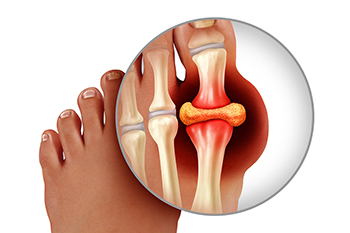
Gout is a type of arthritis caused by the accumulation of uric acid crystals in the joints, leading to sudden, severe pain and inflammation. It commonly affects the big toe but can impact other joints as well. Early symptoms of gout include intense pain, swelling, redness, and warmth in the affected joint, often starting abruptly at night. If left untreated, gout can lead to chronic joint damage, kidney stones, and decreased mobility. Certain factors increase the risk of developing gout, such as a high-purine diet, obesity, and genetic predisposition. Diagnosis typically involves a combination of medical history, physical examination, and laboratory tests to measure uric acid levels and confirm crystal presence through joint fluid analysis or imaging. Managing gout effectively can require medication and lifestyle changes. If you experience persistent big toe pain from gout, it is suggested you schedule an appointment with a podiatrist for a thorough diagnosis and personalized treatment plan.
Gout is a painful condition that can be treated. If you are seeking treatment, contact Stephanie Tine, DPM from Flamingo Foot and Ankle. Our doctor will treat your foot and ankle needs.
What Is Gout?
Gout is a form of arthritis that is characterized by sudden, severe attacks of pain, redness, and tenderness in the joints. The condition usually affects the joint at the base of the big toe. A gout attack can occur at any random time, such as the middle of the night while you are asleep.
Symptoms
- Intense Joint Pain - Usually around the large joint of your big toe, and it most severe within the first four to twelve hours
- Lingering Discomfort - Joint discomfort may last from a few days to a few weeks
- Inflammation and Redness -Affected joints may become swollen, tender, warm and red
- Limited Range of Motion - May experience a decrease in joint mobility
Risk Factors
- Genetics - If family members have gout, you’re more likely to have it
- Medications - Diuretic medications can raise uric acid levels
- Gender/Age - Gout is more common in men until the age of 60. It is believed that estrogen protects women until that point
- Diet - Eating red meat and shellfish increases your risk
- Alcohol - Having more than two alcoholic drinks per day increases your risk
- Obesity - Obese people are at a higher risk for gout
Prior to visiting your podiatrist to receive treatment for gout, there are a few things you should do beforehand. If you have gout you should write down your symptoms--including when they started and how often you experience them, important medical information you may have, and any questions you may have. Writing down these three things will help your podiatrist in assessing your specific situation so that he or she may provide the best route of treatment for you.
If you have any questions, please feel free to contact our office located in Fort Lauderdale, FL . We offer the newest diagnostic and treatment technologies for all your foot care needs.